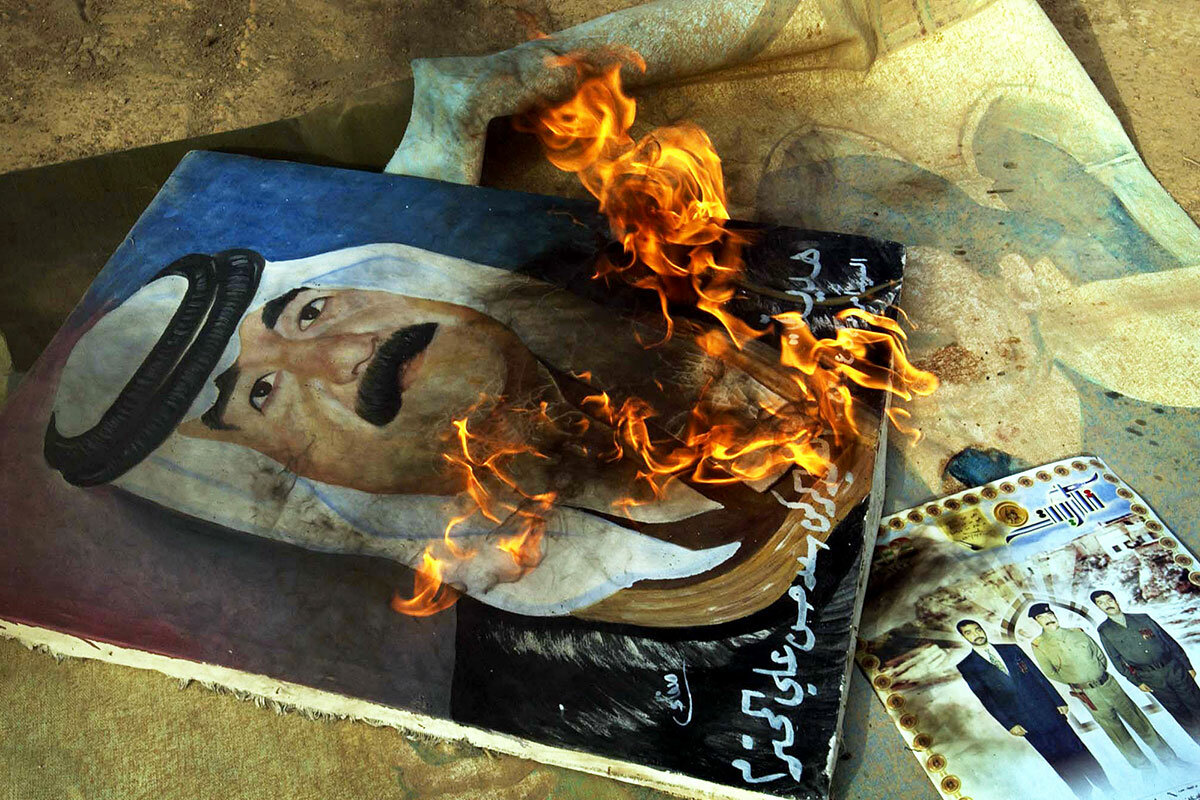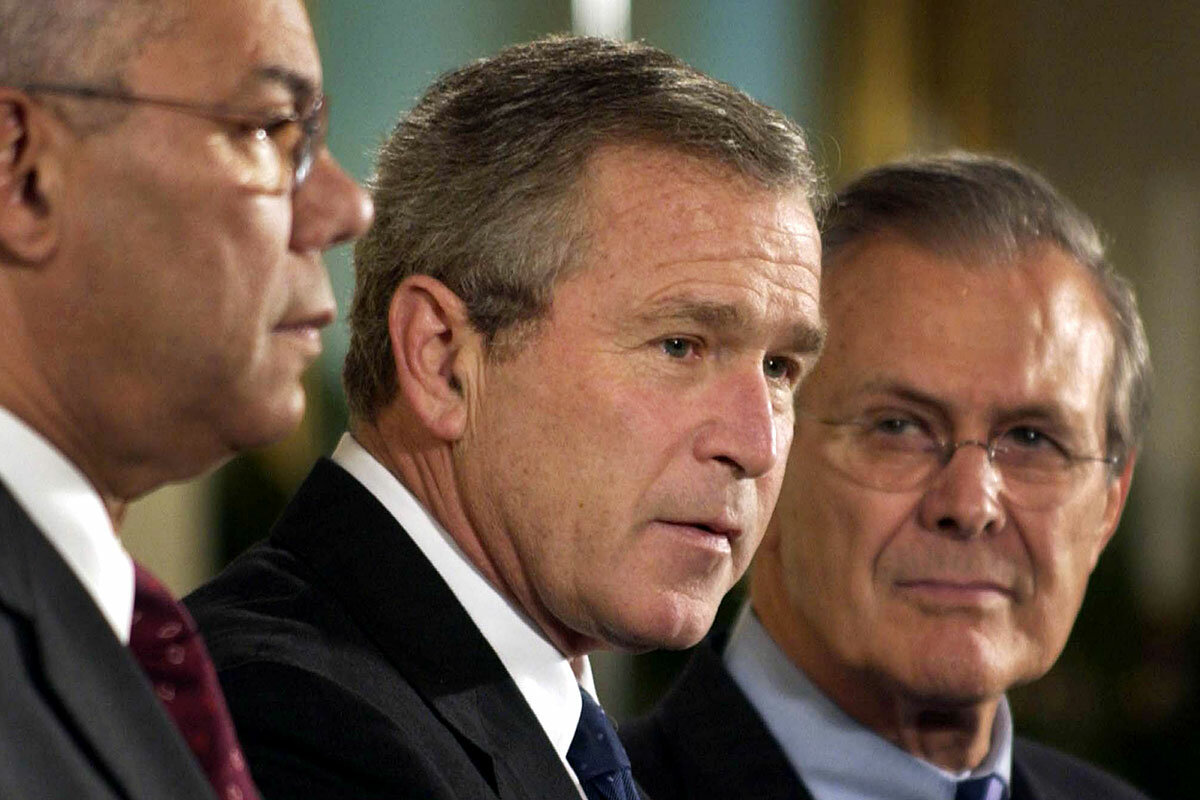Iraq War failures color Biden policy on Ukraine
Loading...
| London
Kyiv, 2023. Baghdad, 2003. Two very different places, engulfed in very different wars.
Yet there’s an essential connection, brought into focus this week by the 20th anniversary of America’s ultimately disastrous invasion of Saddam Hussein’s Iraq.
The most straightforward tie? The long shadow of the Iraq War has colored every major policy decision President Joe Biden has made on Ukraine, ever since Russian President Vladimir Putin massed more than 100,000 troops on the border ahead of last year’s invasion.
Why We Wrote This
President Biden has shown in Ukraine that he has learned the lessons of the Iraq War fiasco from 20 years ago. But the U.S. role in the world remains undecided and controversial.
The multiple ways in which America’s war in Iraq went wrong have made the war a kind of anti-how-to-do-it guide for U.S. involvement in conflicts abroad even two decades later.
That has been the easy lesson of the war.
A tougher challenge remains: resolving fundamental questions raised by the sheer scope of then-President George W. Bush’s war in Iraq – about America’s power, place, role, and responsibility in the wider world.
Above all, that will mean revisiting a principle in international affairs that had been gathering force before the Iraq invasion. For instance, the United States and Britain had used it to justify their use of force to halt the “ethnic cleansing” and wholesale war crimes in the 1990s war pitting Yugoslav forces against Albanians in Kosovo.
It was the notion that nations had a right, even a duty, to intervene on moral grounds – an idea later echoed in the 2005 endorsement by the United Nations of a “responsibility to protect” civilian victims of such atrocities.
This was one of many strands in the decision-making process that led America to attack Iraq – a process that, as one New York Times writer has , remains opaque to this day.
So post-Iraq, is that notion, too, now part of the anti-how-to-do-it playbook? Are there still situations in which values and principles might make geographically distant conflicts a matter of America’s national interest? And can a post-Iraq president credibly make that case to voters in an increasingly divided, inward-looking America?
For now, at least, any and all aspects of the Iraq invasion seem to be a flashing red warning light.
President Biden has clearly applied the “easy lessons” in Ukraine.
He has steered clear of the direct use of American military might. In Iraq, overwhelming force – “shock and awe” – quickly defeated Saddam’s ill-matched military, but set the stage for years of violence and instability.
Mr. Biden has rebutted any suggestion that Washington is looking to force a “regime change” – not, obviously, in the allied democracy of Ukraine, but not in Russia either. The Iraq War explicitly sought to depose Saddam Hussein and, in an overweening act of geopolitical engineering, plant democracy in Iraq and transform the wider Muslim Middle East.
It ended up strengthening America’s main regional foe, Iran, as well as spawning a Sunni jihadist army, the Islamic State.
And while the Bush administration deployed intelligence reports on Saddam’s alleged chemical weapons program to justify the invasion – intelligence that turned out to be wrong – Mr. Biden has taken care to use satellite information and other equally reliable political intelligence to make the case for deliberately more limited, and calibrated, U.S. involvement in Ukraine.
Above all, while Mr. Bush went to war with just one major ally, Britain, President Biden assembled a wide coalition of European and other allies ready to hit back against a Russian invasion with unprecedentedly tough sanctions. In the months since, he has acted in close coordination with U.S. allies to provide funds and weapons for Ukraine’s resistance.
But what of the “hard” part of the Iraq legacy – the wider question of whether all forms of values-based military action should be consigned, along with the other aspects of the Iraq War, to an unlamented dustbin of history?
In Ukraine, interestingly, Mr. Biden has in effect dodged that question. Yes, he has framed the war as pitting an autocratic Russia against democratic Ukraine. But his core justification for U.S. action has been that Mr. Putin’s attack was an unprovoked assault on a neighboring country’s sovereignty in clear violation of the U.N. Charter.
It is that argument that has galvanized overwhelming opposition in the U.N. General Assembly to the Russian invasion of Ukraine.
Whether future U.S. or other Western leaders might revisit the doctrine that came to be known as “liberal interventionism” may depend on how willing they are to look beyond the many failures of the Iraq War and recall other recent conflicts.
Conflicts like the Kosovo War, for instance, when then-President Bill Clinton was ultimately persuaded by British Prime Minister Tony Blair to back a “humanitarian intervention” by NATO countries to protect Kosovar Albanian civilians and force Yugoslav forces to pull out.
Or conflicts where the U.S. and other outside powers did little or nothing to intervene, such as the genocide in Rwanda, just a few years before the Kosovo War.
Leaders will also doubtless recall U.S. and British decisions not to enforce President Barack Obama’s “red line” pledge to take military action if Syria’s dictator Bashar al-Assad used chemical weapons.
Seeking – and failing to win – parliamentary approval for Britain to join this red line response in 2013, then-Prime Minister David Cameron was blunt in his assessment of the Iraq War’s impact. “One thing is indisputable,” he said in his speech. “The well of public opinion was well and truly poisoned by the Iraq episode and we need to understand the public skepticism."
In that light, it may well turn out that there is another lasting casualty of the Iraq War: future Western leaders’ readiness to mount a military response, even to such “values” challenges.










